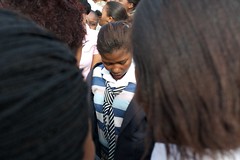
skills race or brain drain

On the seventh day of the South African trip, We met a member of the NEC of the ANC Youth League. I have always had a lot of respect for their struggles and achievement in defeating apartheid. I was keen on finding out how they involve young members in shaping policy, especially in areas of deprivation. I was also interesting in working out how they work with campaigning groups who don’t belong to parties – “the progressive coalition”.
The ANC Youth League is the largest youth organisation in South Africa and historically have always tried to radicalise the ANC. Historically, its most influential leaders have included Oliver Tambo and Nelson Mandela, who in 1962 developed a youth manifesto called the “Programme of Action” that started the civil disobedience campaign that led to Mandela’s imprisonment. The turning point was the Soweto uprising in 1976, where they fought against the government and many were killed. However, this was a watershed for the population that South Africa had to change.
 Since the start of the new democracy, they proposed to have a Youth Month every June. This is personified in the Youth Day which commemorates the Soweto uprising on 16th June 1976, but more importantly celebrates the role that young people can play in society. During this day and amongst other youth leaders, the President of the ANC Youth makes a televised address – indeed according to the person we met, they “call the shots in this country”…
Since the start of the new democracy, they proposed to have a Youth Month every June. This is personified in the Youth Day which commemorates the Soweto uprising on 16th June 1976, but more importantly celebrates the role that young people can play in society. During this day and amongst other youth leaders, the President of the ANC Youth makes a televised address – indeed according to the person we met, they “call the shots in this country”…
The key strategies for the ANC Youth League include
Healthy living campaign: encourage young people to delay having sex and to protect themselves, lobbying institutions to find vaccines as well as targeting alcoholism and drug abuse
Nation building: building dialogue with other races in South Africa to consolidate a multicultural society
Higher education: helping people pay their tuition fees and campaigning for higher education to be free
Political education: work with youth leagues in other countries for better democratisation of the society
Democratisation: campaign for democratising the judiciary and economy
One of their policies has been to ensure uncompromising gender equity, where 50% of every executive – from NEC to local branch – has to be composed of females. If branches decide otherwise, their elections are nullified. The story behind this is that during the apartheid era, women were discriminated against in a very patriarchal society.
We then proceeded to meet a director of the Department of Constitutional Affairs. Albeit being a senior civil servant, he was dressed in a tshirt and blazer, which really relaxed the atmosphere. He was bombarded with questions about the “skills race” and was true to form. He described how the universities were created to serve the apartheid system before 1994.
When democracy came, a program was created to massify further education. This has narrowed the gap in participation rates between blacks (doubling from 21-43%) and whites (60%), with also 53% women and about 20% of students coming from the wider Southern African region.
Racism is still a determinant and although government don’t want to tamper with high performing universities, a commission has recently been charged with investigating social cohesion in higher education. This is also linked to the gap between teacher and research-based universities. The government encourage differentiation of what services students get from universities, but this has led to universities becoming autonomous, tuition fees varying from £7000 to £20000 rand a year.
 Having made those positive inroads into greater equality at HE level, they now want to incentivise greater collaboration with employers, other governments and with SASU. Indeed many students study abroad. For example they are working with Carnegie where students are provided tuition fees on the condition of working in South Africa for the next four years. A good way to tackle the “brain drain”.
Having made those positive inroads into greater equality at HE level, they now want to incentivise greater collaboration with employers, other governments and with SASU. Indeed many students study abroad. For example they are working with Carnegie where students are provided tuition fees on the condition of working in South Africa for the next four years. A good way to tackle the “brain drain”.
However, the state recognises that many private universities – which recruit around 20% of students, mainly people who don’t pass sixth form - don’t make the standard and are particularly keen to improve regulation for foreign universities in setting up local campuses in South Africa. So, they have introduced a skills employment levy, whereby 1% of a company’s profit goes to the levy and a “cola” fund for apprenticeships.
Not being a thorough expert of all things FE and HE, how does this compare with the UK?








0 comments:
Post a Comment